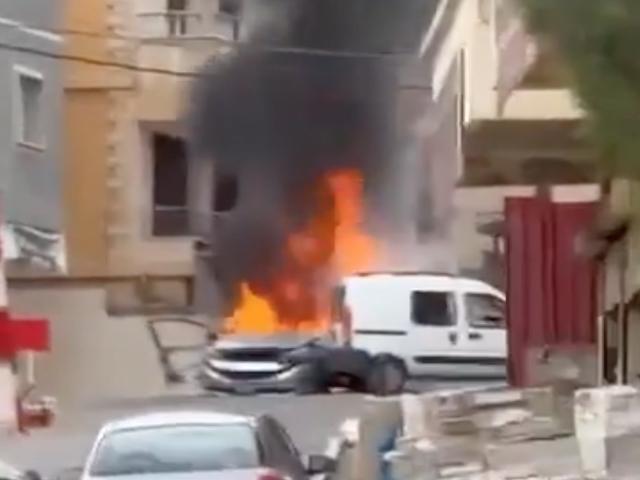Earlier today, an Israeli drone strike in southern Lebanon claimed the lives of two Hezbollah fighters. The attack occurred near the village of Kafra, just 8 kilometers from the Israel-Lebanon border. While the identities and ranks of the casualties remain undisclosed, sources close to Hezbollah confirmed they were not high-ranking members. This incident is part of a series of Israeli operations targeting Hezbollah, a Shia Islamist political party and militant group based in Lebanon.
This development comes amidst heightened tensions in the region. Hezbollah has increasingly engaged in hostilities along Lebanon's southern border, supporting Hamas in the Gaza Strip. Their operations have intensified following a significant incursion by Hamas militants into Israel on October 7. This led to a robust Israeli response, involving an invasion of Gaza supported by extensive airstrikes. The conflict has resulted in substantial casualties and devastation, particularly in the densely populated Gaza area.
Senior members of Hezbollah 🇮🇷 terror leader Hassan Nasrallah’s protection detail have been eliminated in a car explosion in Lebanon 🇱🇧. @Samawal_LLC pic.twitter.com/vyyaj6B7V6
— Avi Kaner ابراهيم אבי (@AviKaner) January 21, 2024
The escalation has not been without consequence for Hezbollah. The group has lost approximately 140 fighters, alongside civilian casualties in Lebanon. Israeli losses include both military personnel and civilians, signaling a growing intensity in the conflict.
In a strategic move to prevent further escalation with Hamas, Israel has been in talks with the United States. Reports from The Washington Post indicate that Israel seeks to distance Hezbollah from the border through diplomatic means by the end of January. However, no firm deadline has been set by the Israeli government.
Hezbollah's response to the October 7 Hamas-led massacre has been marked by persistent attacks against northern Israeli cities. These attacks, including rocket fire, drone strikes, and anti-tank missiles, have led to the displacement of around 80,000 Israeli civilians.
You have no intention on calling on Lebanon and Hezbollah to enforce UN Security Council Resolution 1701 which can guarantee that there will be no war between Israel and Hezbollah?
— Hussain Abdul-Hussain (@hahussain) January 21, 2024
Unless you’re the Islamist Iran regime, why do you think Gaza and Lebanon are connected? That’s… https://t.co/haQ46qInGH
Meanwhile, as things heat up, efforts to de-escalate the situation involve White House envoy Amos Hochstein, who is engaged in shuttle diplomacy between Jerusalem and Beirut. The negotiations center around Hezbollah withdrawing its forces from the border, in compliance with U.N. Security Council Resolution 1701. This resolution, established following the 2006 Lebanon War, mandates Hezbollah's retreat beyond the Litani River, significantly north of the Israeli border. In return, Hezbollah demands Israeli territorial concessions to Lebanon.
Israeli Foreign Ministry Spokesman Lior Haiat emphasized Israel's preference for a diplomatic resolution, while also acknowledging the possibility of independent action if diplomacy fails. This stance was mirrored by Israeli Defense Minister Yoav Gallant, who expressed a preference for diplomacy but cautioned about the proximity to a potential military escalation.
#Breaking: Hezbollah: “Our slap will be painful for the enemy, Our finger is on the trigger.” pic.twitter.com/kZ0HMQfaTn
— Open Source Intel (@Osint613) January 21, 2024
Further complicating the situation, NBC News reported that Israeli Prime Minister Benjamin Netanyahu agreed to a temporary halt in military action against Hezbollah, following discussions with U.S. Secretary of State Antony Blinken. This temporary ceasefire underscores the complex diplomatic efforts underway to stabilize the region.
Hezbollah's military capabilities are formidable, comprising an estimated 150,000 missiles and 25,000 active-duty fighters, many of whom are veterans of conflicts in Syria, Afghanistan, and Iraq. Their strategic plans reportedly include potential incursions into Israeli territory and attacks on key installations, posing a significant threat to regional stability.
Hezbollah has claimed responsibility for 670 attacks against Israel since October 8th.
— Jonathan Schanzer (@JSchanzer) January 21, 2024
Under any other circumstances, this would be a major war. Not here. The Biden admin is restraining Israel (not Iran or Hezbollah).
This is only making a wider war more likely, in my view.
Hezbollah leader Hassan Nasrallah recently highlighted the opportunity for Lebanon to regain control over disputed border areas post-conflict. Conversely, Israeli authorities continue to underscore their readiness for both diplomatic and military solutions to secure their borders and protect their citizens.
This recent strike and the ongoing diplomatic efforts highlight the fragile balance in the region and the critical importance of achieving a lasting resolution to the longstanding conflicts between Israel, Hezbollah, and other regional actors.


